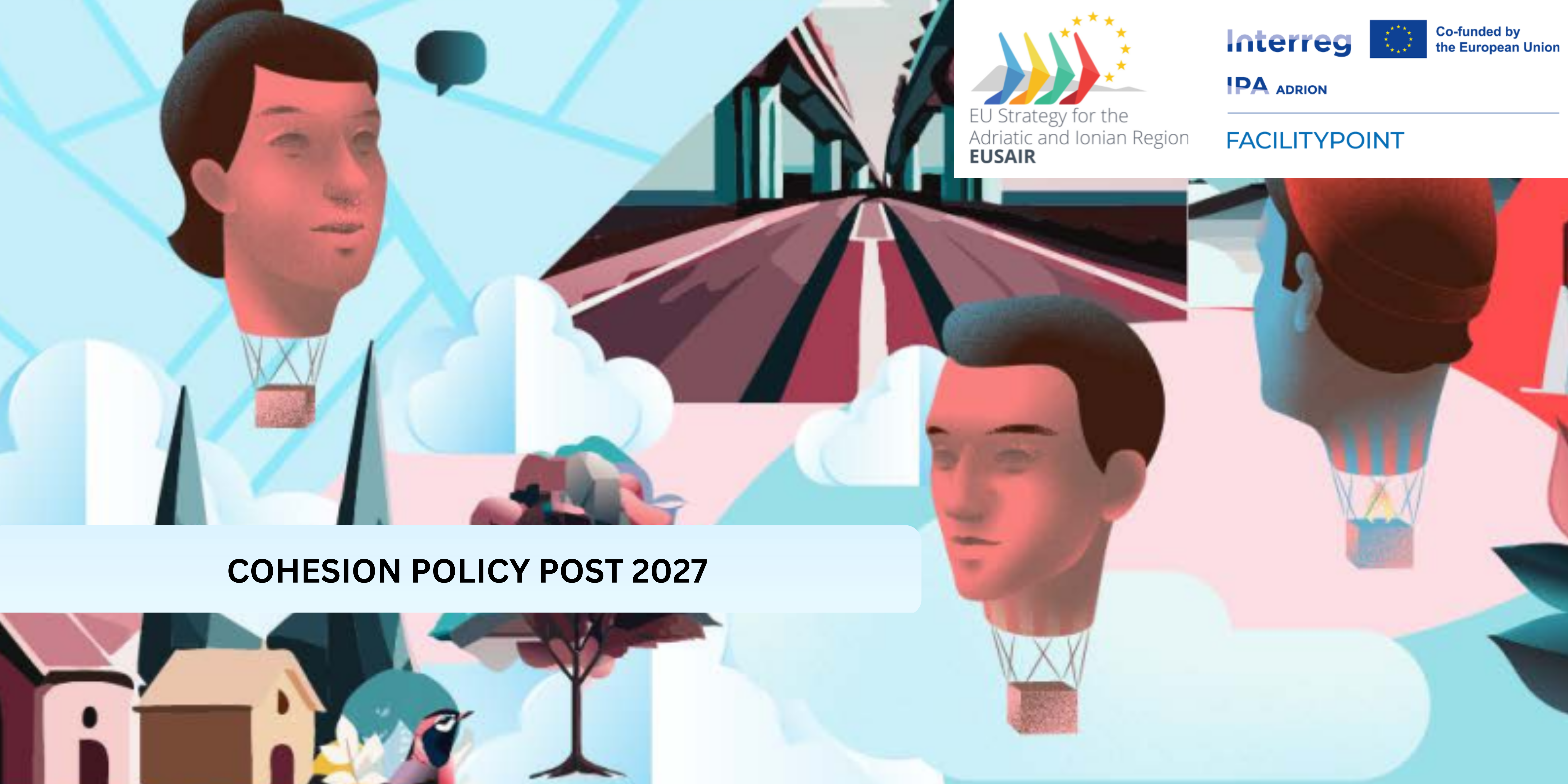
DG REGIO’s consultation process on future Cohesion Policy
The reflection process on the future of Cohesion Policy began across the EU in 2024. Discussions took place within various expert and stakeholder groups, as well as through events and debates, including within the programmes of the Cohesion Policy funds. To this end, the European Commission’s Directorate-General for Regional and Urban Policy (DG REGIO) launched a twofold consultation process to gather opinions, comments, and suggestions on what form Interreg and Cohesion Policy more broadly should take in the next Multiannual Financial Framework.
- DG REGIO encouraged Interreg programmes and macro-regional strategies (MRSs) to run a stakeholders’ consultation as they best know their constituency and already have some experience in this respect (e.g. consultations to prepare the 2014-2020 Interreg, MRSs stakeholder consultations concerning Action Plan revisions),
- Interact gathered inputs from Interreg Programmes and conducted a consultation with Interreg programmes and MRSs on the other.
EUSAIR Cohesion Policy Post 2027 Consultation
The consultation on the future of Cohesion Policy beyond 2027, was conducted by the Facility Point of the EUSAIR (IPA ADRION 2021 – 2027) with the help of StEP (IPA ADRION 2021 – 2027) and the support from M&E Factory company. The consultation was carried out in the context of a broader EU-wide effort to gather insights and recommendations for shaping the future Cohesion Policy in the next Multiannual Financial Framework. Final report on EUSAIR Perspective on future Cohesion Policy Post 2027 considering results from all activities described in detail below was submitted to European Commission in March 2025.
EUSAIR Consultations Activities
-
STAKEHOLDER CONSULTATIONS SURVEY
In order to enhance the cooperation within the Adriatic-Ionian Region and strengthen the role of macro-regional cooperation in the future Cohesion Policy the stakeholders were invited to fill in the survey . The results of the survey will be published here.
-
STAKEHOLDER CONSULTATIONS AT EVENTS
At the 9th EUSAIR Forum in Šibenik on 16 May 2024 a joint session was organized on the topic by EUSAIR and Interreg programmes IPA ADRION and Italy Croatia. Joint summary report of the Session: Shaping Cohesion Post 2027”, can be found following the link Stakeholder consultation_Shaping Cohesion Post 2027 summary report. You can also explore the PPT presentation of the Session following the link: PPT_Stakeholder consultation_Shaping Cohesion Post 2027
-
SURVEY AMONG EUSAIR GOVERNANCE BODIES
At the same time as stakeholder consultation survey a survey among EUSAIR governance bodies was carried out, results of which were considered in the Final Report submitted to European Commission in December 2024. The topic was discussed at Autumn Pillar Thematic Steering Group meetings, National Coordinators’ meetings and at the spring EUSAIR Governing Board.
-
WORKSHOP AND INTERVIEWS WITH EUSAIR EU FUNDS MANAGING AUTHORITIES AND NIPACS
Back to back to Greek Presidency Kick off in Corfu on 1st October 2024 a workshop with workshop with coordination, managing authorities of national and regional programmes and NIPACs in EUSAIR.
Report from workshop with coordination, managing authorities of national and regional programmes and NIPACs EUSAIR post 2027 consultation_MA&NIPACS_Workshop_Report
- FINAL REPORT EUSAIR PERSPECTIVE ON THE ROLE OF MACRO-REGIONAL COOPERATION IN THE FUTURE COHESION POLICY
Results of all EUSAIR consultation activities carried out in 2024 under the guidance of Croatian and Hellenic Presidencies can be found in the Final Report EUSAIR Perspective on the Role of Macro-regional Cooperation in the Future Cohesion Policy. Report was presented at the 24th EUSAIR Governing Board meeting in February 2025 and was further revised in 2025. The Report was drawn up by EUSAIR Facility Point and M&E Factory GmbH.
It can serve as inspiration and guidance for recognition of EUSAIR’s role as a strategic platform that fosters cooperation across the Adriatic-Ionian region, aligning regional needs and leveraging synergies addressing shared challenges like climate change, socio-economic disparities, and EU integration, for further improvements of EUSAIR implementation and foremost the report contains recommendations on how the added value of EUSAIR and macroregional cooperation can be enhanced through the future Cohesion Policy post 2027. Main recommendations for post 2027 Cohesion Policy from EUSAIR are:
- Adopt a European Perspective for Cohesion Policy: The post-2027 Cohesion Policy should prioritize territorial cohesion and multi-level governance, leveraging EUSAIR to foster cooperation and address transnational challenges like climate change and security, while accelerating EU enlargement by aligning candidate countries with EU standards.
- Integrate EUSAIR into Regulatory Frameworks: EUSAIR and other macro-regional strategies should be explicitly embedded in the regulatory framework of future Cohesion Policy instruments to secure funding and support candidate countries’ integration, reducing risks of territorial and social fragmentation during EU enlargement.
- Counter Sectoral Prioritization with Transnational Focus: In a sectoral Cohesion Policy, EUSAIR should ensure national reform plans incorporate macro-regional priorities (e.g., climate change, migration, security), supporting candidate countries’ alignment with EU goals to facilitate their integration during enlargement.
- Capitalization for Greater Impact: EUSAIR should act as a horizontal mechanism to upscale national initiatives and downscale EU policies, maximizing the impact of EU-funded projects in both candidate and member states to strengthen the socio-economic and geopolitical benefits of enlargement.
- Strategic Prioritization of EUSAIR in Enlargement: Given that five of EUSAIR’s ten participating countries are EU candidates (Albania, Bosnia and Herzegovina, Montenegro, North Macedonia, Serbia), policymakers should prioritize EUSAIR as a key instrument for building administrative capacity, fostering knowledge exchange, and aligning these countries with EU acquis in areas like environmental protection and transport to ensure a smoother enlargement process.
Final Report EUSAIR Perspective on the Role of Macro-regional Cooperation in the Future Cohesion Policy (full version) EUSAIR_Consultation_Final_report_2025-03_rev
Summary of Policy Recommendations EUSAIR_Consultation_Summary Recommendations from Final Report_2025-03_rev
HARVESTING REPORT ON POST 2027 INTERREG
This Harvesting Report on Post-2027 Interreg presents the results of stakeholder, citizen, and programme consultations carried out in 2024 as part of the broader reflection on the future of Cohesion Policy. Overall, the consultations led to the following major conclusions regarding post-2027:
- Interreg is both a tool and a policy to bring European values and policies close to the people through cooperation governance, trust building, communities and citizens’ actions, place-based approaches (customised to local needs) and joint projects.
- Interreg is appreciated for its role in opening up new opportunities for cooperation, reaching beyond borders, fixing the issues linked to the
different legal and administrative systems (hampering the full opportunities of the Single Market) and learning from each other (thereby benefitting from Europe’s diversity); - Interreg is crucial for candidate countries, outermost regions and neighbouring countries (especially it prepares the accession of
candidate countries); and - Interreg acts on the territories of several Member States and, in many cases, it also involves non-Member States; therefore, it needs to keep the key elements of its ecosystem built and successfully tested over 35 years (i.e. programmes with common budget, joint preparation and implementation, shared management).
Read the Harvesting Report On Post 2027 INTERREG HERE!







